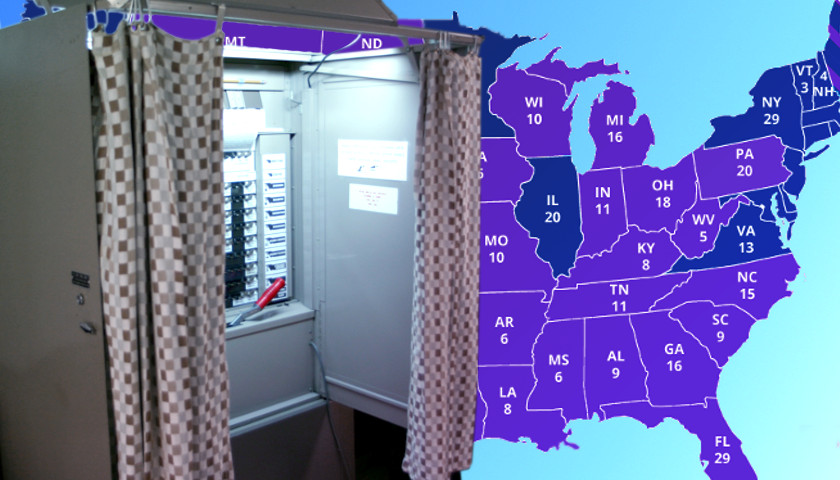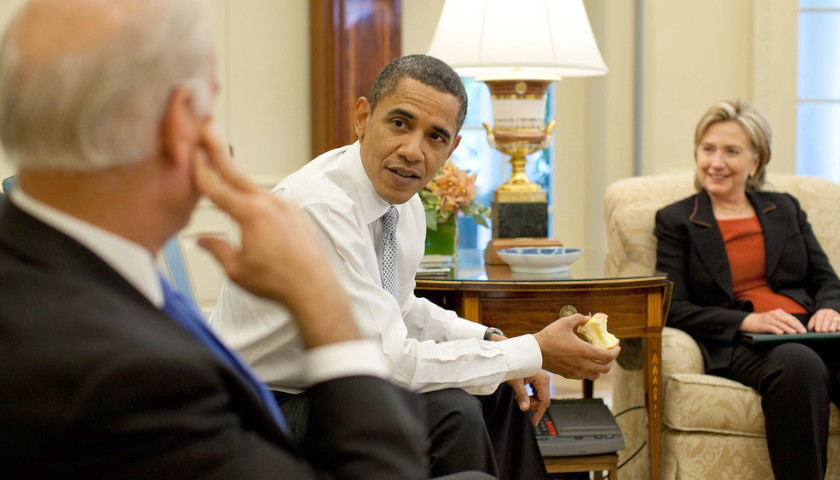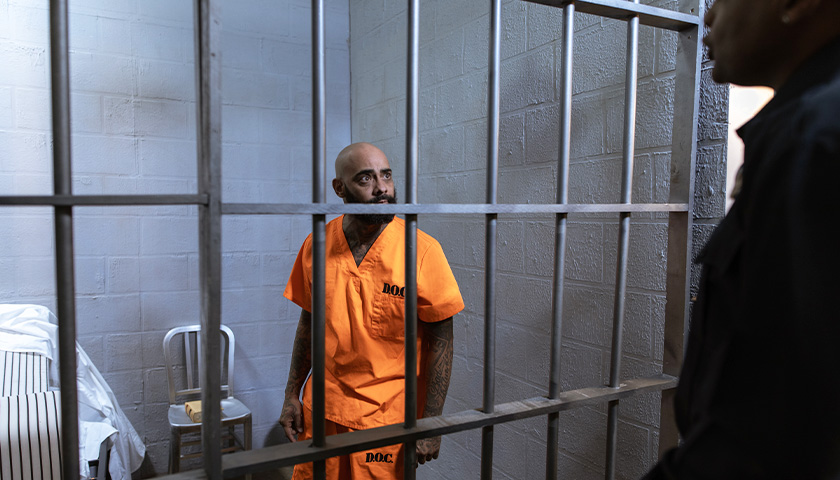by Michael S. Kochin
If you thought, or hoped, that the brave (or nobly self-interested) Democratic Governor of Nevada, Steve Sisolak had thwarted the push for a National Popular Vote by vetoing the bill, think again.

On June 12, 2019, Oregon Democratic Governor Kate Brown signed it into law for her state. As of this writing 15 states and the District of Columbia, each with 196 electoral votes, purport to have ratified it. According to its terms as few as three more states (say Texas, Michigan, and Pennsylvania) with 74 electoral votes need to enact the bill for it to go into effect. Should it go into effect, the compacting states, together accumulating a majority of the Electoral College, will cast their electoral votes for whomever is the plurality winner of what the scheme’s backers call “the national popular vote:” whichever presidential and vice-presidential slate gets a plurality of votes when the total votes of all the states (compacting and non-compacting) are aggregated.
The scheme, of course, is an effort to change the Constitution without the bother of securing the consent of three-fourths of the states that the Article V Amendment procedure requires. It is also of questionable validity without the consent of Congress.
While the Supreme Court might rule against allowing an interstate compact to go into effect without the prior Congressional consent that the Constitution’s Article I section 10 requires for states to enter into interstate compacts, it also might not. And since the National Popular Vote folks think they can change the Constitution while flouting the rules for changing the Constitution, they might feel equally free to ignore whatever the Supreme Court tells them the Constitution requires. And whatever can or cannot get through today’s Congress is no guarantee that some future Congress might not find the National Popular Vote acceptable while ignoring the pesky requirement of prior Congressional consent.
Yet the basic reason why the so-called National Popular Vote scheme threatens democracy is that it does not, and cannot, enact a national popular vote that is nationally regulated and supervised. The whole scheme rests on the constitutionally entrenched state control of the selection of presidential electors. What its backers call the “national popular vote” is, as they themselves acknowledge, the aggregate of votes in 51 separate jurisdictions with 51 separate sets of ballot access laws, voter identity checks, and voter eligibility requirements.
Nothing in this scheme, for example, requires that any participating state let any particular candidate on the ballot. The same California legislature that has enacted the National Popular Vote is considering a bill – a bill that has already passed the California Senate – that would require every presidential or vice presidential candidate to release his or her tax returns. The Hillary Clintons and Joe Bidens, candidates foresighted enough to launder their payola through tax-exempt foundations or by having the bribers hire their kids for ludicrous wages, can release their tax returns without fear.
And if state officials can’t steal an election legally, they can always do so illegally. In states like Washington and Oregon, which have only mail-in balloting, or in states like California, which allow absentee voting without any demonstrated need, federal authorities cannot in practice keep officials from flooding or allowing activists to flood the “state popular vote” with out-of-state residents with fake addresses, who mail in ballots in every state for which they can download and send in a ballot, or outright ghost voters who are nothing more than a name and a fake registration. With the electoral college as it is, one-party states like California can allow as much fraud and force as they like, but they can only swing their own state’s electoral votes. With the National Popular Vote scheme, California officials can swing Maryland’s and New York’s electoral vote by stuffing ballot boxes without bothering to leave Sacramento.
Electing the president of the United States by national popular vote might be a bad idea, but it is not transparently fraudulent to argue that American should adopt, by an Article V Amendment, a genuine nationally, that is to say, federally, supervised popular vote. Americans might prefer the kind of system that the Chileans used to elect Castro’s buddy Salvador Allende, or a national two-round popular vote of the kind French used to put in the utterly feckless François Hollande. But claiming to enact a national popular vote while trusting the integrity of the process to the competence and disinterestedness of state officials who have little incentive to be either competent or disinterested just might be the biggest election swindle in American political history.
– – –
Michael S. Kochin is Professor Extraordinarius in the School of Political Science, Government, and International Relations at Tel Aviv University. He received his A.B. in mathematics from Harvard and his M.A. and Ph.D. in political science from the University of Chicago. He has held visiting appointments at Yale, Princeton, Toronto, Claremont McKenna College, and the Catholic University of America.






The National Popular Vote bill is 73% of the way to guaranteeing the majority of Electoral College votes and the presidency to the candidate who receives the most popular votes in the country, by changing state winner-take-all laws (not mentioned in the U.S. Constitution, but later enacted by 48 states), without changing anything in the Constitution, using the built-in method that the Constitution provides for states to make changes.
It requires enacting states with 270 electoral votes to award their electoral votes to the winner of the most national popular votes.
All voters would be valued equally in presidential elections, no matter where they live.
Candidates, as in other elections, would allocate their time, money, polling, organizing, and ad buys roughly in proportion to the population
Every vote, everywhere, for every candidate, would be politically relevant and equal in every presidential election.
No more distorting, crude, and divisive and red and blue state maps of predictable outcomes, that don’t represent any minority party voters within each state.
No more handful of ‘battleground’ states (where the two major political parties happen to have similar levels of support) where voters and policies are more important than those of the voters in 38+ predictable winner states that have just been ‘spectators’ and ignored after the conventions.
We can limit the power and influence of a few battleground states in order to better serve our nation.
The bill would take effect when enacted by states with a majority of the electoral votes—270 of 538.
All of the presidential electors from the enacting states will be supporters of the presidential candidate receiving the most popular votes among all 50 states (and DC)—thereby guaranteeing that candidate with an Electoral College majority.
The bill was approved in 2016 by a unanimous bipartisan House committee vote in both Georgia (16 electoral votes) and Missouri (10).
Since 2006, the bill has passed 40 state legislative chambers in 24 rural, small, medium, large, red, blue, and purple states with 271 electoral votes.
The bill has been enacted by 16 small, medium, and large jurisdictions with 196 electoral votes – 73% of the way to guaranteeing the presidency to the candidate with the most popular votes in the country
“Every vote, everywhere, for every candidate, would be politically relevant and equal”
What sort of controlled substance have you been smoking? This statement is so absurd it would be laughable if the potential danger wasn’t so great. In fact, the only votes that would be important would be those in the largest states. Votes cast in MT, ID, ND, SD, WY, etc. would be worthless, so candidates wouldn’t even bother campaigning there.
The electoral process was put into the Constitution precisely to prevent this sort of tyranny of the majority. Without it, it’s very unlikely that the Constitution would have been ratified by the requisite nine States, and the United States of America wouldn’t even exist as a single nation.
If you think times have changed and the electoral process should also be changed, then do it legally by following the Constitution’s amendment procedure. That’s why it’s there!
This is bull it’s illegal but democrats don’t care they are always doing something illegally!!